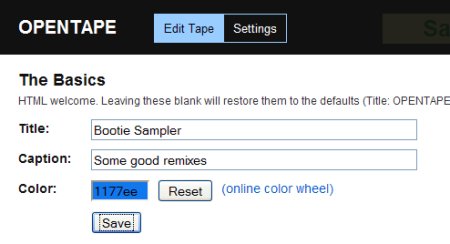
While Muxtape takes a breather to resolve an issue with the RIAA, Lifehacker has a step by step guide on installing and running Opentape, an open source PHP web application that’s similar to Muxtape. Take matters into your own hands and create your own version of playlist hosting heaven. Since Opentape is open source, you can adapt it and make it an even better application. Maybe your creation will be even more popular than Muxtape… and will lead to the same problems with the RIAA.
OpenSource19 Articles
Adeona: An Open Source Laptop Tracking System
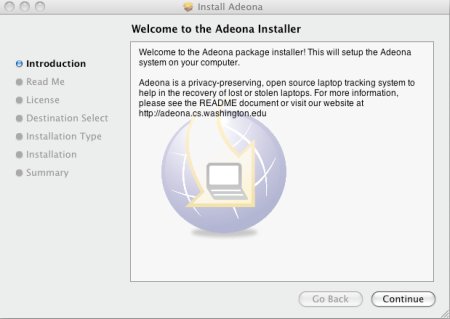
Adeona is an open source internet-based laptop tracking system that is free to use. It’s available for Linux, OSX, and Windows XP/Vista. After installation, Adeona will submit at random intervals, anonymously encrypted updates on the computer’s location to servers on the Internet, specifically to OpenDHT, a free storage service. The information is kept on the servers for one week. If your laptop becomes lost or stolen, you can use the retrieval tool to access information about where your laptop was last used: the external IP address, internal IP address, and nearby routers. If your laptop is a Mac, you can also download isightcapture to grab a picture of the thief. Adeona is designed to protect against common criminals who may not have much technological knowledge, and does not have any protections against events such as disk wipes. The open source nature of Adeona’s system means that there’s ample opportunity to improve upon the release or add extensions. Here’s one user who really likes what he sees.
[via Schneier]
Install Debian On The Nokia N810
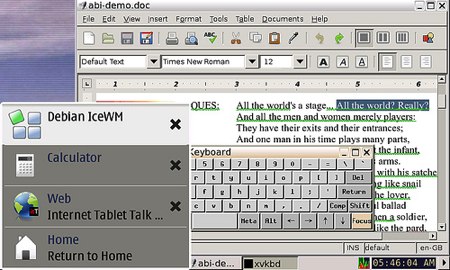
The Nokia N810 tablet is a great buy, especially for hackers. It already ships with a Linux-based operating system, called OS2008, which is based upon Maemo 4.0. However, for those who aren’t fans of OS2008, you can install Debian easily with some patience and an extra memory card. The Debian install includes OpenOffice, Firefox 3, AbiWord, and IceWM. You should be aware that there are pitfalls. Some of the applications run slowly, and you may be in danger of losing data if you run into problems.
[via Unwired View]
Netflix Player Source Code Released
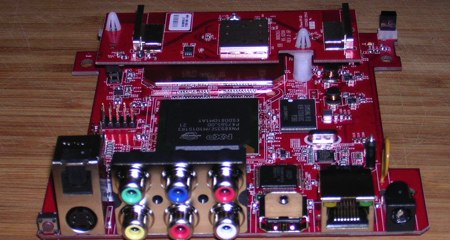
The Netflix Player continues to gain in popularity. Roku has finally released the GPL code for their Netflix Player. Just today Forbes published that Roku would roll out a software update allowing it to stream from other online services. The diminutive device has no internal storage and just enough RAM to buffer the stream. Many have wondered how a Linux box is handling the DRM; this is purely a feature of the NXP PNX8935 processor being used. While waiting for the code, hackers have already popped the box open to see what’s inside. We found [hokiokie7]’s photos of the internals on Roku’s forum. The only really interesting thing we’ve seen so far is that the WiFi is on a daughter card that plugs into the USB. That should make it much easier to support other devices, if users ever manage to get into the system.
UPDATE: [mbailey] points out in the comments that he was able to telnet to the device.
Open Source Symbian

Nokia recently announced its plans to purchase Symbian and formed the Symbian Foundation with the intention opening the software platform over the next two years. Symbian is already present on 60% of all cellphones in the world. With such a massive install base, open source Symbian has a much better chance of taking off than platforms like Android, which are starting on the ground floor.
Free Web Development Tools

OStatic has a collected some great free tools for web developers. We talked about Quanta in an earlier post, but this article reaches beyond just HTML editors. LaunchSplash can be used to generate splash pages while you build. IBM, responsible for the Eclipse IDE, has built Project Zero to encourage web app development; even the IDE is web based. OpenX is an open ad server. Piwik is a free web analytics package. There are also quite a few open source CMS’s and sites collecting open source designs.
Finding Sensitive Data With Freeware
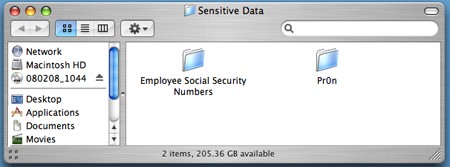
When an organization’s network grows to a certain size, its difficult to keep track of every single piece of sensitive information like credit card numbers or social security numbers. In order to find and secure this data, companies often turn to data loss prevention (DLP) services. This is not a viable option for many organizations, though, as DLP services can often be expensive and time-consuming to deploy.
Such organizations are not entirely without options: a recent article on Dark Reading lists several DLP tools authored by teams from various universities, all free to download and use. Programs like The University of Texas at Austin’s Sensitive Number Finder and Virginia Tech’s Find_SSN were designed to find pieces of data on computers and servers formatted in ways typical to sensitive information (xxx-xx-xxxx for SSNs, for example). This approach can often lead to false positives, so some measure of human control is required. They are also incapable of scanning application servers or other forms of data in transit. Cornell’s Spider can scan various application server types using different protocols. When used in conjunction, all of these apps can help secure your data without the expense of outsourcing the job.










